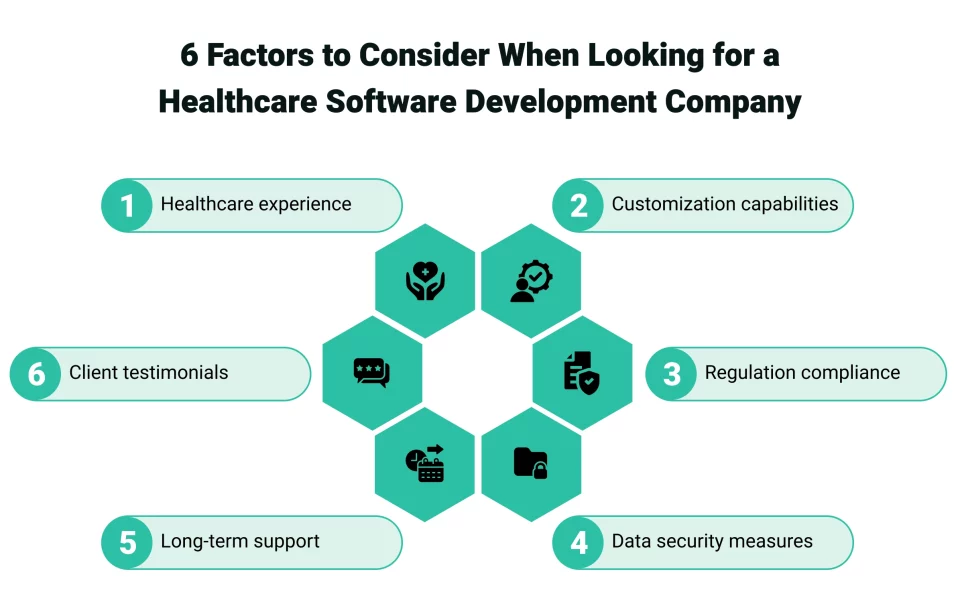INTRODUCTION
Discover how the right custom healthcare solution can transform your operations
The demand for custom software solutions has never been more pressing in the fast-evolving healthcare landscape. Medical practices today face many challenges, from managing patient data securely to ensuring compliance with ever-changing regulations and delivering exceptional care. Off-the-shelf software often needs to address the unique needs of healthcare providers, making custom healthcare software a game-changing investment. Tailored solutions empower practices to streamline operations, improve patient engagement, and stay ahead in a competitive industry.
However, the success of implementing custom software lies in the technology and choosing the right development partner. A reliable custom healthcare software development company does more than just deliver code; it becomes a strategic ally. The right partner brings expertise in healthcare technology, a thorough understanding of industry compliance, and a commitment to building solutions that align with your practice's goals. This collaboration can transform your practice, creating a seamless ecosystem that enhances efficiency and fosters better patient outcomes.
The stakes are high, but so are the rewards. Selecting the right development company isn’t just about technical expertise—it’s about shared vision and trust. A dedicated partner will prioritize your needs, offering personalized solutions and ongoing support to help your practice thrive. Your practice can improve workflows, ensure data security, and elevate the patient experience with the right choice. This guide will help you navigate the decision-making process, ensuring you choose a partner who will drive your practice toward sustained success.
IMPORTANCE OF EXPERTISE
The right technology partner can empower your practice to deliver exceptional care
Healthcare software development is a uniquely complex field that demands precision, security, and a deep understanding of the medical landscape. Unlike generic applications, healthcare solutions must handle sensitive patient data, comply with stringent regulations, and integrate seamlessly with existing healthcare infrastructure. A small misstep in design or functionality can lead to regulatory violations, inefficiencies, or compromised patient safety. This high-stakes environment calls for developers who are not just tech-savvy but also well-versed in the intricacies of healthcare.
One of the most critical aspects is patient data security. With the rise in cyberattacks targeting healthcare systems, developers must implement advanced encryption, secure access controls, and regular vulnerability assessments to safeguard information. Healthcare compliance laws such as HIPAA, GDPR, and HITECH raise the stakes, as failure to meet these standards can result in hefty fines and loss of trust. These complexity layers require developers who understand security protocols and can effectively navigate the evolving regulatory landscape.
Interoperability is another key challenge that underscores the need for specialized expertise. Healthcare providers rely on various systems—from electronic health records (EHR) to telehealth platforms and diagnostic tools. Custom software must integrate with these existing systems to ensure a cohesive and efficient workflow. Developers lacking healthcare-specific knowledge may struggle to create interoperable solutions, leading to fragmented processes and diminished patient care quality.
No matter how skilled, general software companies often need more industry-specific knowledge to tackle these challenges. They may excel at coding but falter when understanding clinical workflows, patient care priorities, or the nuances of compliance. Partnering with a company specializing in healthcare software ensures technical proficiency and a tailored approach that addresses the unique needs of medical providers. This specialized expertise turns a software solution into a vital tool for better patient engagement outcomes and operational excellence.
Do you want to unlock the maximum potential of your practice with our solutions?
CRITERIA FOR CHOOSING
Choosing the right company can be the difference between seamless efficiency and costly inefficiencies
Proven track record in healthcare software development
A company with a proven track record in healthcare software development brings invaluable experience to the table. Their past projects demonstrate their ability to navigate the complexities of healthcare operations, ensuring their solutions are reliable and effective. Their portfolio should showcase a deep understanding of healthcare workflows and patient care requirements, from developing advanced telehealth platforms to implementing seamless EHR systems. Working with a company with a history of successful healthcare projects minimizes risks and ensures you are partnering with experts familiar with the industry's nuances.
Additionally, an established track record reflects the company’s ability to overcome challenges, meet deadlines, and adapt to evolving client needs. Experienced developers understand the importance of creating solutions that integrate smoothly with existing systems while addressing operational bottlenecks. By choosing a company with a history of delivering successful healthcare solutions, you can trust their ability to design, build, and support software that empowers your practice to achieve better outcomes.
Expertise in healthcare regulations and compliance
Regulatory compliance is a cornerstone of healthcare software development, making it crucial to work with a company that thoroughly understands standards like HIPAA, GDPR, and HITECH. These regulations mandate strict controls over patient data privacy, security, and access. A knowledgeable partner ensures your software adheres to these guidelines, reducing the risk of data breaches, legal penalties, and loss of patient trust. Their expertise in compliance translates to built-in safeguards such as encryption, secure user authentication, and audit trails.
Moreover, healthcare regulations are ever-evolving, and an adept development partner stays updated. This proactive approach ensures your software remains compliant, even as standards shift. Look for a company that provides documentation and clearly explains how their solutions meet compliance requirements. Their ability to navigate these complex frameworks ensures your software’s legality and establishes a solid foundation for secure, patient-centered care.
Security standards and data protection practices
Healthcare data is one of the most sensitive types of information, making robust security standards a non-negotiable requirement. The right development partner will prioritize data protection through practices like end-to-end encryption, multi-factor authentication, and regular vulnerability testing. Their approach to cybersecurity should align with industry best practices and regulatory requirements, ensuring your software withstands potential threats.
Furthermore, a strong commitment to security goes beyond the technical aspects. It includes ongoing monitoring, timely updates, and a disaster recovery plan to mitigate risks and ensure continuity. Evaluate whether the company conducts regular audits and incorporates the latest cybersecurity technologies to safeguard data. By choosing a partner with a strong emphasis on data security, you protect patient information and your organization’s reputation.
Customization capabilities to meet unique needs
Every healthcare practice has distinct requirements, and cookie-cutter software solutions often fail to address them effectively. A company with strong customization capabilities ensures the software is tailored to your needs, whether integrating with existing systems, optimizing workflows, or enhancing patient engagement. Custom healthcare software solutions allow you to incorporate features that align perfectly with your operational goals, ensuring the software becomes a valuable asset rather than a generic tool.
Additionally, customization fosters scalability, allowing the software to grow with your practice. A good development partner will work closely with you to understand your pain points and long-term vision, creating a solution that adapts to future challenges and opportunities. Their ability to provide flexible, personalized solutions ensures your investment delivers maximum value and supports your practice’s evolving needs.
Strong portfolio and client testimonials
A comprehensive portfolio offers a glimpse into a company’s expertise and capabilities. When evaluating custom healthcare software development services, review the company's portfolio to see examples of past projects, particularly ones similar to your needs. This showcases their ability to deliver quality solutions and familiarity with healthcare-specific challenges. Look for evidence of innovation, user-friendly designs, and successful implementation of complex features like interoperability and compliance.
Client testimonials provide another critical layer of insight. Positive reviews from healthcare providers highlight the company’s reliability, communication skills, and commitment to delivering results. Testimonials can also reveal how well the company handles post-launch support, a vital component of any successful software partnership. A strong portfolio and glowing reviews indicate a partner you can trust to create software that drives efficiency, compliance, and improved patient care.

Key considerations for selecting the best healthcare partner for your practice
PRACTICE'S NEEDS
Finding a partner who understands your unique needs is key to a successful solution
Assessing your practice’s requirements for custom solutions
Before embarking on the journey to develop custom healthcare software, it’s crucial to assess your practice’s unique needs thoroughly. Every healthcare organization operates differently, with distinct workflows, patient demographics, and operational goals. Start by analyzing the specific pain points you aim to address—improving appointment scheduling, streamlining billing processes, or enhancing data management. Involve your staff in this assessment, as their day-to-day experience can provide invaluable insights into inefficiencies and areas for improvement.
This evaluation process should also consider your long-term goals. Are you looking to expand your practice? Integrate telehealth services? Improve patient retention? Defining your objectives helps you prioritize features and align your software requirements with your practice's growth trajectory. By assessing your needs upfront, you lay a solid foundation for choosing or developing software that aligns with your goals and delivers tangible benefits.
Identifying critical features of your software
Once you’ve assessed your needs, the next step is identifying the critical features your software must include. For example, if patient engagement is a priority, features like secure messaging, appointment reminders, and educational resources could be essential. Practices focused on operational efficiency might prioritize workflow automation, real-time data access, and seamless EHR integration. Think about your immediate requirements and functionalities supporting your future ambitions.
It’s also important to consider user experience when defining features. Overly complex or unintuitive software can frustrate patients and staff, undermining its benefits. Focus on features that simplify tasks, improve communication, and enhance overall satisfaction. Collaborating with a development partner experienced in healthcare can help you refine your feature list and ensure it aligns with industry best practices.
Defining needs before starting your search
Defining your practice’s specific needs before engaging a development partner ensures a more focused and productive collaboration. Investing in a solution that doesn’t fully address your challenges or offers unnecessary functionalities is risky without clear requirements. Create a detailed list of “must-have” and “nice-to-have” features to guide discussions with potential developers.
This pre-planning phase lets you communicate your expectations, helping the development team create a tailored solution that meets your specifications. By understanding your needs and defining them early, you streamline the development process and increase the likelihood of achieving a software solution that transforms your practice.
Do you want to build a custom healthcare software tailored to your unique needs?
QUESTIONS TO ASK
Look for experience, process handling, and post-launch support in a company
When selecting a healthcare software development partner, their answers to your questions can reveal critical insights into their expertise, approach, and reliability. Look for clarity and specificity in their responses, as these traits indicate a deep understanding of the complexities of healthcare software. A qualified company should address your queries, proactively highlight potential challenges, and propose tailored solutions. Pay close attention to whether they offer examples of past projects, particularly those that align with your requirements, as this demonstrates their ability to deliver on similar needs. Avoid companies that provide vague or overly generic answers, which may suggest a lack of experience or focus.
One of the most important areas to explore is the team’s expertise in custom software development for healthcare. Ask about their familiarity with industry regulations like HIPAA, GDPR, and HITECH to gauge their ability to ensure compliance. Questions like “What is your experience with healthcare-specific software, such as EHR systems or patient portals?” can illuminate their domain knowledge. Additionally, inquire about the technical skills of their team, such as proficiency in creating secure systems and integrating with third-party healthcare platforms. A capable team will have a strong track record of delivering projects that balance innovation with compliance and reliability.
The company’s development process also plays a significant role in determining project success. Ask how they approach the software development lifecycle, from initial consultation to final deployment. Inquire about their flexibility in handling changes to requirements, as healthcare projects often evolve due to new regulations or organizational needs. A structured yet adaptable process can ensure the project stays on track while accommodating necessary adjustments. Transparency in timelines, deliverables, and communication protocols is also a positive sign of their professionalism and commitment to meeting your expectations.
By asking targeted questions about expertise, processes, and support, you can identify a partner capable of delivering a solution that meets your practice’s unique needs.
EVALUATION
A company with strong technical foundation can adjust to healthcare’s fast-paced environment
A solid technical foundation and an effective development process are crucial to project success when evaluating a healthcare software development company. The healthcare industry demands precision, compliance, and adaptability, so choosing a company that understands these requirements is essential. Look for a partner with demonstrated expertise in healthcare technology, including experience with electronic health records (EHR) systems, patient portals, and secure data management. Their ability to leverage innovative technologies like artificial intelligence, telehealth integrations, or IoT solutions for remote patient monitoring can set your software apart in an increasingly competitive market.
The company's development process can significantly impact your project's efficiency and outcome. Agile development, for example, emphasizes flexibility, iterative progress, and regular client collaboration, making it ideal for healthcare projects that may evolve due to regulatory updates or changing user needs. Conversely, while a Waterfall approach offers a more linear and structured method, it can be less adaptable to unforeseen changes. The right partner will tailor their approach to align with your project’s requirements, ensuring smooth progress and timely delivery without compromising quality or compliance.
A company’s commitment to innovation should also extend to its technical skills. Knowledge of secure coding practices, cloud computing, and system interoperability is vital for developing solutions that meet the industry’s stringent standards. Furthermore, their ability to integrate new technologies while maintaining user-friendliness ensures that the software addresses technical requirements and enhances patient and staff experiences. Choosing a company with the right mix of technical expertise and a well-suited development process positions your healthcare software for long-term success in a fast-paced, regulated environment.
Are you looking for long-term success in the healthcare world?
POST-LAUNCH SUPPORT
Choose the right partner to gain long-term success
Post-launch support is vital to the success of healthcare software, as the industry constantly evolves with new regulations, technologies, and patient needs. A reliable development partner should provide a clear plan for ongoing maintenance, including regular updates, bug fixes, and compliance adjustments. This ensures your software remains secure, functional, and aligned with industry standards. Additionally, a dedicated support team should be available to address technical issues promptly, minimizing disruptions to your operations. Choosing a partner committed to long-term collaboration can significantly enhance the reliability and effectiveness of your software over time.
Scalability is equally critical to future-proofing your healthcare software. As your practice grows or adapts to new service offerings, your software should be able to handle increased demands without compromising performance. A scalable solution ensures seamless integration of additional features, users, or functionalities as needed. By working with a development company that designs systems with scalability in mind, you can avoid costly overhauls or replacements down the line—investing in scalable, well-supported software guarantees that your solution evolves alongside your practice, delivering consistent value for years to come.
SUMMING UP
Custom solutions can boost efficiency, enhance compliance, and improve patient satisfaction
Choosing the right custom healthcare software development company can profoundly impact your practice's efficiency, compliance, and patient satisfaction. A trusted partner brings expertise in healthcare technology, a strong understanding of industry regulations, and the ability to create tailored solutions that address your needs. By evaluating potential companies based on their experience, technical skills, development approach, and commitment to post-launch support, you can identify a partner who shares your vision for transforming your practice through technology.
Investing time in this selection process ensures the software meets current requirements and scales to accommodate future growth and advancements. A collaborative, innovative partner will help your practice stay ahead in a competitive and ever-evolving industry. Ultimately, the right development company doesn’t just build software; it builds solutions that empower your practice to deliver exceptional care and achieve long-term success.
We create the perfect custom solution to streamline your operations
People Also Ask (PAA) questions
- What should I look for in a healthcare software development company?
Look for a company with proven healthcare experience, a strong understanding of regulations like HIPAA, and expertise in developing secure, scalable solutions. Their track record, technical skills, and post-launch support capabilities are also essential factors to consider. - How do I choose a custom healthcare software provider?
Choose a provider with a demonstrated history of successful healthcare projects, a robust development process, and a commitment to compliance and data security. Ensure they offer a personalized approach and can adapt the software to your needs. - What are the benefits of custom healthcare software?
Custom healthcare software is tailored to meet your practice's unique needs, enhancing efficiency, improving patient care, and ensuring regulatory compliance. It provides flexibility, scalability, and the ability to integrate seamlessly with existing systems. - Why is regulatory compliance important in healthcare software development?
Compliance ensures that your software adheres to industry standards like HIPAA and GDPR, protecting patient data and reducing the risk of costly fines or legal issues. It also builds trust with patients and regulatory bodies, ensuring secure, ethical handling of sensitive information. - How do custom software companies ensure data security in healthcare?
Custom software companies employ robust security measures such as encryption, secure authentication, and regular vulnerability assessments to protect patient data. They also stay updated on the latest cybersecurity protocols to ensure compliance with healthcare regulations. - What questions should I ask a healthcare software developer?
Ask about their experience in healthcare, knowledge of regulatory standards, development methodology, and how they address data security. Inquire about the timeline, ongoing support, and how they handle future software updates and scalability. - What are the key features of good healthcare software?
Good healthcare software should offer user-friendly interfaces, secure data management, integration with existing systems, and compliance with regulatory standards. Additional features like patient portals, appointment scheduling, and telemedicine capabilities enhance patient engagement and operational efficiency.






